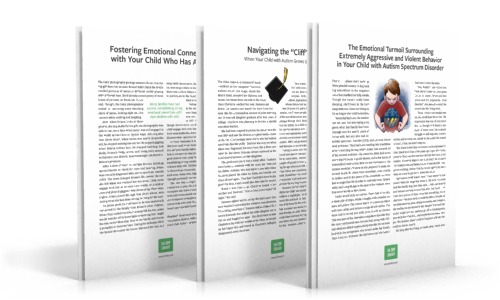Through His Eyes: Natural and Logical Consequences at Home
Written By: Nancy Yeang
Resource Creation By: Bridget Morton
Design By: Sunny DiMartino
I walked through the front door and set down my briefcase, which was holding work I still needed to get done for the next day. I loosened my tie, went to look for my family, and found my 10-year-old son Tommy sitting in the living room.
“Hey there Tommy boy, how are you?” I grinned at him from across the living room. He glanced back at me for a moment, barely taking his eyes off the TV.
“Hi Dad. I’m good,” said Tommy.
“Did you finish your homework?” I asked him.
“Yeah,” Tommy said, as he remained glued to the TV screen.
I felt a twitch in the back of my head after hearing the irritation in Tommy’s tone. I knew I would have to go over Tommy’s homework before bed and before I could start on my own work. At the last parent-teacher conference, Tommy’s teacher emphasized that my son often seemed distracted and was having difficulty completing assignments thoroughly in school. The statement seemed like an exaggeration at the time, so I started checking Tommy’s work each night.
Sure enough, each time Tommy said he finished his homework, I would always find something missing—a handful of math problems that weren’t finished, or answers on his English writing assignments that were too short and done in messy handwriting. His teacher also told us that his reading comprehension was a bit below grade level. My wife and I tried to get him to read at home more often, but he rarely showed interest no matter what we tried. Every time I asked him why he didn’t finish his homework, or if he’d read his book, he would get testy and argue with me.
I let out a breath of exhaustion and frustration in anticipation of tonight’s homework battle. “Can you keep the volume down on the TV please? There’s no reason for it to be blaring.”
“Oookkayyyy,” Tommy obliged and lowered the volume, keeping his eyes glued to the screen. I was annoyed with his tone of voice, but I wanted to avoid a fight, so I shook my head and made my way to the kitchen to see what everyone had for dinner. Coming home on these late nights, I often missed the family dinner, which was one of the few times I could talk with Tommy.
Not again, I thought as I surveyed the area. Trash, still not taken out after dinner. Dishes piled in the sink and not in the dishwasher. None of Tommy’s daily chores were completed.
“TOMMY!” I shouted, losing that sense of calm I’d been trying to maintain.
“WHAT?” Tommy yelled back.
“COME HERE!”
Tommy scuffled into the kitchen. “What?” he said, visibly annoyed at being interrupted, television remote still in his hand.
“We’ve discussed this already, you need to take out the trash and load the dishwasher after everyone eats,” I said.
“But I finished my homework, and Mom said that if I finished my homework I could watch TV,” Tommy retorted.
“That might be what your mom said, but we’ve also talked to you about doing your chores after dinner. This is all we ask of you—take out the garbage and load the dishwasher. That’s it. Mom meant chores first, then TV. That’s the rule and you know it,” I said. I knew my wife was probably upstairs getting the baby ready for bed at this hour.
“But Mom did SAY that I could watch TV after I finished my homework! I’m not lying!” Tommy’s voice started to rise. I knew that if he continued to escalate, it was going to be difficult to calm things down. I chided myself internally for letting myself raise my voice so quickly. Why was it so hard to keep my cool? I didn’t act this way with my parents, that’s why… I told myself in reply. Why can’t I straighten out my own kid?
“I understand what your mom probably told you, but you still need to take out the trash and take care of the dishes before you watch another show,” I said. “Your mom and I can’t do everything around here. We’re both busy with work, taking care of the baby and you, and each of us has a lot of things to take care of around here. We need you to pitch in, especially because you’re getting older.”
“I hate those chores, plus I did my homework already….” I knew this conversation was going to continue in circles. Tommy would try to convince me that what he did was okay since his mom told him it was, and I would repeatedly lecture him on the importance of his chores until we both became upset with each other and meaningful communication ceased. I became too exhausted to keeping going with this topic, and I still had a few hours of work to do. So what happened next? Well, I got ticked. I pointed a finger at Tommy, which I knew never really made things better, and could actually trigger him, but I was thin on patience, hungry, feeling a little sad and angry, and couldn’t help myself.
“Listen Tommy, I’m sick of arguing about this over and over. Your mom and I need your help around here, it’s just the damn garbage and dishes, so just do as you are told!”
Tommy rolled his eyes at me and just stood there with his arms crossed. My voice then started to rise and I was almost yelling. “If you are not going to do what you’re told, then get upstairs and go to your room! Now! And no more TV for the rest of the night! And if you keep it up you’re gonna lose it tomorrow night too.”
“Fine!” Tommy erupted and threw the remote across the kitchen. It smashed on the wall behind me, the pieces clattering on the tile floor. “It’s not like there’s anything else that you can take away from me anyway!”
“HEY!” I yelled, but Tommy was already running up the stairs. The banging sound as he slammed his bedroom door shut reverberated throughout the house.
I dropped my head. It was true. I had already taken Tommy’s computer, MP3 player, Legos, and even his dresser out of his room. This wasn’t Tommy’s first outburst and this wasn’t the first time I was taking something away. When his anger escalated, and he was this upset, whatever was in his hand would end up flying across the room, like the remote.
Each time Tommy acted out, I took away something as a punishment, in order to teach him that there were consequences for his behavior and actions. But Tommy didn’t seem to tie the consequence to his behavior, especially when he was upset and angry in the moment, and it seemed to just make things worse. In fact, lately, he seemed to be getting angry more quickly, almost like he was expecting me to take something from him. Our relationship seemed to be shaky, even on good days. I noticed that we didn’t really smile much at each other anymore and it almost seemed like we were always getting ready for a fight. I know I was.

I bent down to pick up the pieces of the remote control. I pinched the area between my eyes and shook my head.
It wasn’t like this when I was growing up. Every time my dad took something away, I understood that I needed to stop doing whatever I was doing wrong. He just had to give my sister and me “the look” and we knocked it off. Why isn’t this working with Tommy? Why can’t he just understand that his parents are in charge and that we make up the rules in this house?
“Honey?” I heard my wife Suzie’s footsteps come down the stairs softly, like she was trying to tiptoe past the eruption happening in Tommy’s room. “Hi. What happened?”
“You know what happened,” I held the pieces of the remote control in front of her as I stood.
“Oh no….” She put a hand on her forehead.
“You told him TV was okay right after his homework? What about his chores? You can’t just keep going easy on him all the time. We have to be on the same page with him,” I told Suzie, the frustration building inside me again. “He’s going to feel like he can play us against each other and slack off around the edges. When I tell him to do his chores, he then throws a fit.”
“Don’t put this on me, what did YOU do to set him off? He was fine when I went upstairs,” Suzie shot back at me. “You know he acts up more than other kids. He’s touchy. It’s just the way he is. Hmm, sounds like somebody else in this house, doesn’t it? We have to just relax with him a little bit.”
“Relax? RELAX? When do I ever get a chance to relax? I go to work and that new boss keeps throwing all kinds of work at me. I have to bring work home so that I can catch up and have some room to breathe the next day. All I want is a calm house, happy family, and for Tommy to be a peaceful and pleasant 10-year-old like all of the other ones out there. Just like I was when I was growing up,” I said all in one breath, exasperated.
My wife did not appear impressed.
“Well, what about me? When do I get to relax? The one time I have all day all for myself was right after the baby fell asleep and Tommy was watching TV. But then YOU come home, and that moment of calm vanishes! All hell broke loose and remotes are getting thrown at the wall!” Suzie snapped back.
We stood in silence looking at each other, both breathing heavier. It hadn’t been easy. Tommy was not a “normal” 10-year-old despite my wish that he was. While he always had a “high motor” according to his teachers and sometimes “liked to talk to his neighbors,” we had noticed they were sending home more behavior reports. He also had outbursts at school, especially when the work was difficult for him. Of course, he said it was boring. He also hadn’t been getting along too well with his peers, didn’t seem to have any close friends, and his grades were poor. His teachers had recommended that we discuss his behavior with our pediatrician to see if there were any attention-related issues, but he hadn’t been diagnosed with anything. “He’s just a regular, active 10-year-old boy,” shrugged the doctor. But the intensity of his behavior problems kept increasing and I wasn’t sure what to do anymore.
“Maybe we need to start looking for some serious help,” Suzie said, and I knew she was right.
***
A week and a half later, my wife and I found ourselves sitting on a couch in the office of John White, a behavior counselor that had been recommended to us by the social worker at Tommy’s school.
“…and he always erupts in agitation or explosive behavior,” I explained.
“From what I understand, you’ve been taking things away from Tommy in an attempt to get him to follow your requests?” John asked.
“Yes, but it hasn’t been working at all. Actually it’s getting worse,” I said.
“OK,” he inhaled deeply. “In these kinds of situations we find that we need to do some detective work to get at the root of the behavior, or the underlying reason, so that we can treat it at its source, rather than always relying on consequences or punishment every time,” he began. “How about, we start from scratch? And by starting from scratch, I mean we’ll start by giving back Tommy’s things. All of them,” John said, looking at me.
I paused, looking over at Suzie. She gave me a slight nod.
“Are you sure? What kind of message will that send to him? That it’s okay to do what he’s been doing?” I asked.
“Sometimes it is best to start over. Starting over with his belongings also sends a message that you care about what is happening and are making an effort. It’s also possible that he has lost some incentive to comply at this point, because he has nothing left. I’ve also seen the parent-child relationship become stressed when parents take things away, and that, well, can create some bigger problems over time. Tell me, does he know exactly when he will get his things back?” asked John.
“Well, not really. I told him when he shows us he’s ready. It’s up to him and his behavior, basically,” I said.
“Okay, and how is that going?” asked John.
“Not great. I think it’s at the point where we are both not budging,” I said.
“All right. I see now,” said John. “Well, what do you think about starting over? Sort of trying to jump-start change?”
“I think we can do that,” I said.
“Halleluiah,” said Suzie, looking over at me. “Sounds like a little flexibility.”
“Good. Okay, the next step would be to start keeping better track of Tommy’s outbursts, or times that he gets really upset, yells, does not cooperate, or starts damaging things,” John said. “Record all of the details. The date and time, what happened before Tommy’s outburst, what you did, how did Tommy react to what you did… everything. Also try to start paying attention to not only Tommy’s behaviors, but to your behaviors as well. What do you notice about how your reactions cause a reaction in him? Outbursts sometimes seem like they happen out of the blue, but when we start looking at it more closely we usually see patterns emerge.”
I already recognized some of the triggers that I knew would set Tommy off, but instead of paying attention to his cues and trying to redirect him during difficult moments, I realized I had a tendency to personalize the situation, which in turn increased my own anger. I knew I shouldn’t let this happen, but at times I couldn’t help it. It was hard to be patient and calm at the end of a long workday, knowing I would face the same issues at home every night, and dealing with a disrespectful child. “I’ll try to be more aware of everything that happens before an outburst, but if we don’t have strict consequences in place, I don’t know how any of this will work to help improve his behavior,” I said.
“It’s never easy being a parent, and some consequences that work for one child, won’t work for another,” John said. “The main thing to remember is to try to approach the conflict situation calmly and firmly. When people are upset they often become inflexible and rigid, which can make the situation worse. If you can lead by example, modeling calmness and rationality, and keep yourself from reacting in a way that further triggers Tommy, you’ll be that much closer to a better ending. I know it’s hard, but consistency across parents is also key—he needs to know you are both on the same page in what you expect and how you are going to respond. Also—and this is very important—kids are very used to adults telling them the what, but we aren’t very good at telling them the why. Does that make sense? For example, the what is ‘Take out the garbage after dinner’ and the why is ‘because we are a family, we all help out, and we want a clean home.’ Do you think he knows that?” asked John.
“Well, we’ve never said it exactly that way, but I’m sure he’s smart enough to know the reason,” I said.
“Well, we need to make sure your son not only knows the specific expectation, but then also the specific reason for it in the first place. Remember that adult concerns usually revolve around health, learning, safety, or impact of behavior on others. Kids need to understand that—and most importantly they need to hear it when everybody is calm and not in the moment of agitation or power struggle.” He paused.
“I’m with you and I get it. But, I’m not going to lie, it’s certainly different than how I was raised,” I said.
“Yes, and you are different than your son,” said John. “When parents remove items or privileges as a response, or consequence, for misbehavior, what we are usually doing falls under the category of logical consequences. In other words, he does something wrong, such as not completing his chore, and there’s an immediate consequence from you, which is taking away a preferred item or privilege—with the ultimate goal being to motivate him to follow the expectation next time. It sounds as if this has not been working very well and that it might be time to try something else.” My wife and I nodded.
“If you were to approach him more with natural consequences, such as, if he breaks the remote, then the TV won’t work and he can’t play video games for a week, then he might draw more of an association between his behavior and the effects. Plus, it’s a natural effect of his behavior—and not contrived or ‘made up’ like other consequences from parents. If it’s broken… then it doesn’t work. Pretty simple. It’s real-life. Another more extreme example would be if he doesn’t take out the trash, or if he doesn’t load the dishwasher, then the trash and dishes start piling up, and the house starts to smell and there are no clean dishes. He would be able to see for himself what the direct and natural results of his actions are,” he said.
“Oh, no way we can let that happen!” my wife exclaimed, and I looked at John with incredulity.
“Well, you can easily not have a new remote available for a bit, and I know it may be hard to imagine, but just let the dishes or trash go for a little bit, and see what happens next time he goes for a clean cup or plate and there isn’t one. In these situations, I find this approach can be pretty effective,” John explained. “When he’s upset, the intensity of the interaction is probably overwhelming and he’s having a hard time reasoning, so try approaching your son calmly, maybe even giving him some space, and using the minimum language necessary to help him calm down, so that he may return to more rational and reasonable thinking. After he is calm and the dust has settled, see if there is a natural consequence for the situation; try it and see how it goes. If you aren’t able to use a natural consequence, then try a logical consequence that is clearly tied to the behavior.”
***
Later that night I looked over at my son. “I think that’s everything. Is there anything you’re missing, Tommy?” I asked, as I placed Tommy’s mini action figures on top of his dresser—facing his bed just like he liked them.
Tommy was silent. I wasn’t sure if it was because he wasn’t paying attention to me, or if he was thinking about what I said to him. But the silence was better than him throwing Superman at me.
“Could you show me some of your homework assignments now that we’ve got your room set up?” I asked to break the silence and because it seemed like a good time to ask.
“NO, NO, NO!” Tommy yelled and grabbed the book in my hand and threw it. “I hate English! All the kids make fun of me because I can’t read as good as they do!” He continued to throw everything that was in his path and threw the papers on his desk on the ground. “It’s horrible!”
I took a step back and watched Tommy’s outburst. Trying to make better sense out of it. Out of habit, I wanted to grab all of the mini-figures and say, “Okay, these are mine now, buddy,” but stopped myself. I willed myself to remember John’s words… to try something new, don’t react intensely and recreate the vicious cycle. I just stayed present—told him he seemed upset, we’d talk when he was calm, gave him some space, and let the time pass—until he calmed down. Things also didn’t get worse because I wasn’t adding “fuel to the fire,” like John said, by telling him what to do, how ridiculous his behavior was, and what I was going to take away. My goals had changed from teaching him about right vs. wrong “in the moment” of crisis—to promoting a return to calm, balanced, and more rational thinking.
Amazingly, he calmed down pretty quick—maybe in five minutes, but not before he grabbed his superhero action figures and threw them. One broke apart when it hit the corner of his desk. His eyes went wide and he paused when he saw one of Superman’s arms come out of its socket. He looked at me curiously, taking in the situation, and the calm look on my face.
“Tommy,” I carefully approached him. “What happened to Superman?”
“He broke,” Tommy said while looking at his figurine.
“How did that happen?”
“I got mad and broke him.”
“This can happen when we get mad and throw things. They might break,” I said. “Now you don’t have a Superman with both arms. You don’t want any of your other toys to break, do you?”
Tommy was silent again and then finally sat down in the middle of his room, his chest heaving from the energy he just spent. I was proud in that moment, seeing Tommy calm on his own. He seemed to be thinking about what had happened and what he had done. I also realized that Tommy had always had a quick temper and seemed to get more easily frustrated than other kids his age. Maybe this more calm parenting approach made sense. I wondered how many times—despite my best intentions—I had made things worse by getting angry myself. I made a mental commitment to try to change, knowing it would be difficult. I also imagined Tommy at school, no one playing with him, and kids laughing at him because he didn’t understand the work the same way they did. I felt the frustration build up in my chest—not at Tommy, but at how others were seeing him. How I had been seeing him.
I sat down on the floor in front of Tommy and placed the English book gently on the ground. I put my hands on both of his shoulders, and looked into his hazel eyes.
“I understand you get frustrated. Everyone does. I know I do,” I said as I met my son’s intense, wondering gaze with reassurance and love. “Let me help you.”
*This story is part of a series based on the experiences of educators, parents, and the staff at Genesee Lake School, a nationally recognized provider of services for students with special needs. GLS is part of MyPath, an employee-owned family of companies whose mission is to make a difference in the lives of people with disabilities.

Sign Up to Receive New Posts
We promise not to spam you or share your information with anyone. And you can unsubscribe at any time . . . although we hope you stay a while!





